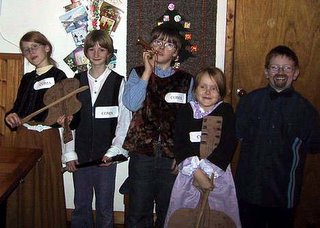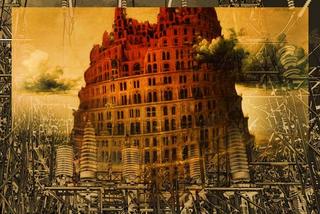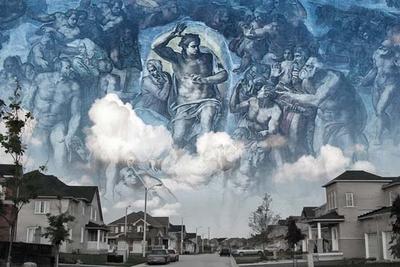
Today is Hallowe’en, the ancient European festival of Samhain, “summer’s end”, which was the most magically potent time of year, and even, it has been suggested, New Year. This was the night when the autumn fires would burn to provide, according to the Celtic Spirit website, “an island of light within the oncoming tide of winter darkness, keeping away cold, discomfort, and evil spirits long before electricity illumined our nights”. People would take a part of the fire to re-light their own hearths; in some parts of Scotland this custom apparently continued up till the First World War, the time when so many folk traditions were extinguished.
These popular so-called “Celtic” sources (though this is something of a misnomer) often tell us that at Samhain the “veil between the worlds” was at its thinnest; I have always liked this image as it makes me think of a cacophonous crowd of mischievous sprites and daemons pushing this nebulous membrane so that the tiniest rent could quickly become a rift that would send them tumbling through into our suburban streets. Of course, in the old tradition, the veil was one between the living and the dead. It was above all a festival of the ancestors, and hence its modern incarnation as a night teeming with ghostly nasties. Finally, Samhain also marked the end of the harvest; all the remaining crops in the fields were thenceforth subject to the malign influence of faeries and, being thus accursed, must not be gathered.
In my own little Scottish village, we had traditions of our own. I used to go “guising” as a child, which was a real thrill, given that I did not normally go out at night for any reason. Dressed up fairly carelessly, usually as Tom Baker-era Doctor Who, although I may have had one or two other guises, I ventured forth clutching my nightlight-in-a-jar lantern, which inevitably went out with the first serious gust of wind. (I never actually had a turnip lantern until a friend of mine made one when I was in my thirties.) I remember other costumes being really inventive – in particular, my best friend Alan’s parents would go to great efforts, and one year he was “Mr Music”, clad head to toe in a paper suit and hat patterned with real musical scores. We all had a little routine to do to earn nuts, sweets and coins from the neighbours: this would consist of a song, a poem, jokes, etc. We went to some lengths to learn these by heart. One of my neighbours, an elderly woman with no children, was exceptionally generous. She always stockpiled a mound of goodies, including homemade toffee, and as her reputation spread, children came from far and wide to knock on her door. Eventually, she’d run out of stuff and have no option but to put the lights out and sit in silence to end the siege.
This all sounds so quaint now, like something from between the wars, even though it was in the 1970s! There was no “trick-or-treat”-ing then; this was a later American import. Above all, we all felt safe to roam the streets unaccompanied, which was the real treat. It’s not just ancient customs that have been consigned to the grave.







